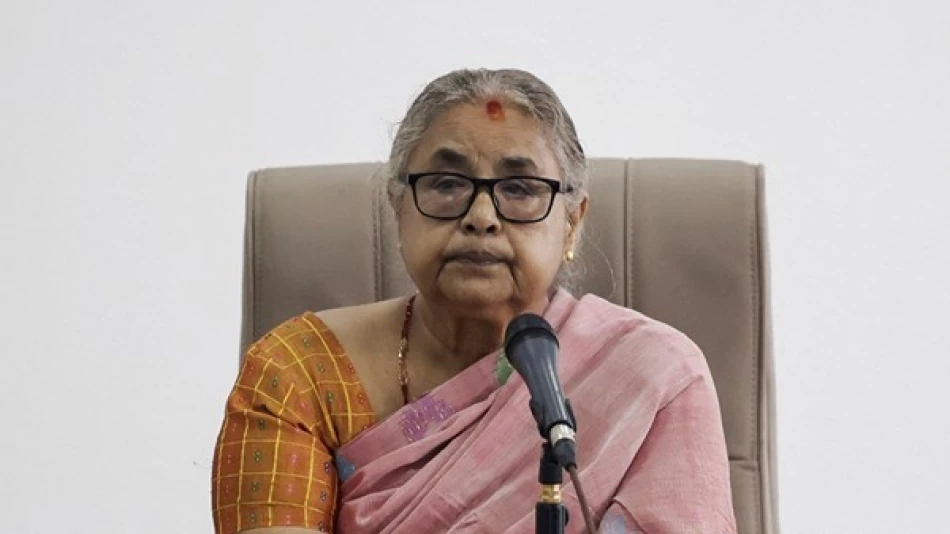
Nepal PM Pledges to Tackle Corruption, Restore Public Trust
Nepal's First Female PM Takes Power After Deadly Gen Z Uprising Claims 72 Lives
Nepal's political landscape has shifted dramatically as Sushila Karki, the country's first female prime minister, assumes power following violent protests that killed at least 72 people and forced her predecessor to resign. The 73-year-old former Supreme Court chief justice faces the daunting task of addressing Generation Z's demands for anti-corruption measures and economic equality within a tight six-month timeframe before scheduled elections.
A Historic Appointment Born from Crisis
Karki's ascension to power represents a watershed moment for Nepal, but it comes at an extraordinarily challenging time. The former chief justice, known for her independence and outspoken nature, acknowledged the unusual circumstances of her appointment, stating that she "never desired" the position and that her name "emerged from the streets" during the protests.
The violent demonstrations in Kathmandu on Monday and Tuesday marked the most significant civil unrest since 2008, with updated casualty figures reaching 72 dead and 191 injured. The scale of the violence underscores the depth of public frustration with Nepal's political establishment and economic stagnation.
Generation Z's Political Awakening
What sets these protests apart is their demographic composition and digital organization. Nepal's Generation Z—those born between the late 1990s and early 2010s—mobilized through social media platforms to demand systemic change. Their core demands center on eliminating corruption, establishing good governance, and achieving economic equality.
Karki demonstrated her understanding of this generational shift, pledging to "work in alignment with Generation Z thinking." This represents a significant departure from Nepal's traditionally gerontocratic political culture, where elderly male politicians have dominated for decades.
A Race Against Time
President Ram Chandra Paudel dissolved parliament immediately after Karki's appointment and called for legislative elections on March 5, 2026—exactly what the young protesters had demanded. This creates an unprecedented situation where Nepal's first female prime minister must deliver tangible results in just six months.
Karki's interim government faces several immediate challenges: rebuilding government buildings damaged during the riots, restoring public confidence in institutions, and implementing visible anti-corruption measures. The government complex in the capital still bears scorch marks from fires set during Tuesday's protests, serving as a stark reminder of public anger.
The Anti-Corruption Imperative
Nepal's corruption problems run deep, with the country ranking poorly in international transparency indices. The Himalayan nation has struggled with endemic graft across government institutions, from local municipalities to federal ministries. Karki's legal background and reputation for integrity may provide credibility, but systemic change requires more than symbolic leadership.
Her promise to "put an end to corruption" resonates with a generation that has grown up witnessing political scandals and economic stagnation despite Nepal's strategic position between China and India—two of the world's fastest-growing major economies.
Regional Implications and Economic Pressures
Nepal's political instability carries broader regional significance. The landlocked nation serves as a crucial buffer between Asian giants China and India, both of which have invested heavily in Nepalese infrastructure and political influence. Political uncertainty could impact major projects, including China's Belt and Road Initiative investments and India's cross-border trade relationships.
The economic dimensions of the crisis cannot be overlooked. Nepal's youth unemployment remains high, and many young people seek opportunities abroad, contributing to significant brain drain. Generation Z's demands for "economic equality" reflect frustration with limited domestic opportunities and growing wealth disparities.
A Test Case for Democratic Transitions
Karki's appointment through street pressure rather than traditional political negotiations represents a new model for democratic transitions in South Asia. Unlike typical power transfers orchestrated by established parties, this transition emerged from grassroots mobilization amplified by social media.
The success or failure of this experiment will likely influence similar movements across the region, where young populations increasingly challenge traditional political structures through digital organization and street protests.
With parliament dissolved and elections scheduled for early 2026, Karki's interim administration must prove that responsive governance is possible. Her commitment to a six-month timeline creates clear accountability metrics—a stark contrast to Nepal's history of prolonged political transitions and coalition instability.
The coming months will determine whether Nepal's democratic institutions can adapt to generational change or whether the country faces continued political turbulence. For now, the world's youngest protesters have successfully installed the country's first female prime minister, creating an unprecedented opportunity for transformative governance in the Himalayas.
Most Viewed News

 Layla Al Mansoori
Layla Al Mansoori






